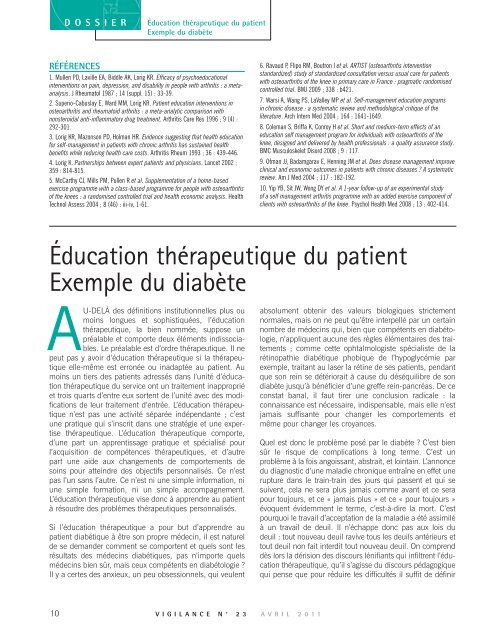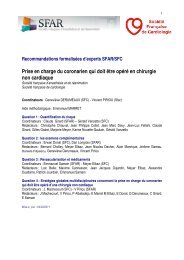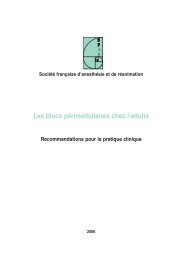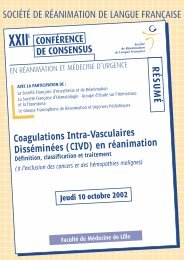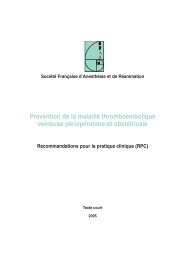Éducation thérapeutique du patient Comment améliorer le ... - Sfar
Éducation thérapeutique du patient Comment améliorer le ... - Sfar
Éducation thérapeutique du patient Comment améliorer le ... - Sfar
Create successful ePaper yourself
Turn your PDF publications into a flip-book with our unique Google optimized e-Paper software.
DOSSIER<br />
<strong>É<strong>du</strong>cation</strong> <strong>thérapeutique</strong> <strong>du</strong> <strong>patient</strong><br />
Exemp<strong>le</strong> <strong>du</strong> diabète<br />
RÉFÉRENCES<br />
1. Mul<strong>le</strong>n PD, Lavil<strong>le</strong> EA, Bidd<strong>le</strong> AK, Lorig KR. Efficacy of psychoe<strong>du</strong>cational<br />
interventions on pain, depression, and disability in peop<strong>le</strong> with arthritis : a metaanalysis.<br />
J Rheumatol 1987 ; 14 (suppl. 15) : 33-39.<br />
2. Superio-Cabuslay E, Ward MM, Lorig KR. Patient e<strong>du</strong>cation interventions in<br />
osteoarthritis and rheumatoid arthritis : a meta-analytic comparison with<br />
nonsteroidal anti-inflammatory drug treatment. Arthritis Care Res 1996 ; 9 (4) :<br />
292-301.<br />
3. Lorig KR, Mazonson PD, Holman HR. Evidence suggesting that health e<strong>du</strong>cation<br />
for self-management in <strong>patient</strong>s with chronic arthritis has sustained health<br />
benefits whi<strong>le</strong> re<strong>du</strong>cing health care costs. Arthritis Rheum 1993 ; 36 : 439-446.<br />
4. Lorig K. Partnerships between expert <strong>patient</strong>s and physicians. Lancet 2002 ;<br />
359 : 814-815.<br />
5. McCarthy CJ, Mills PM, Pul<strong>le</strong>n R et al. Supp<strong>le</strong>mentation of a home-based<br />
exercise programme with a class-based programme for peop<strong>le</strong> with osteoarthritis<br />
of the knees : a randomised control<strong>le</strong>d trial and health economic analysis. Health<br />
Technol Assess 2004 ; 8 (46) : iii-iv, 1-61.<br />
<strong>É<strong>du</strong>cation</strong> <strong>thérapeutique</strong> <strong>du</strong> <strong>patient</strong><br />
Exemp<strong>le</strong> <strong>du</strong> diabète<br />
A<br />
U-DELÀ des définitions institutionnel<strong>le</strong>s plus ou<br />
moins longues et sophistiquées, l’é<strong>du</strong>cation<br />
<strong>thérapeutique</strong>, la bien nommée, suppose un<br />
préalab<strong>le</strong> et comporte deux éléments indissociab<strong>le</strong>s.<br />
Le préalab<strong>le</strong> est d’ordre <strong>thérapeutique</strong>. Il ne<br />
peut pas y avoir d’é<strong>du</strong>cation <strong>thérapeutique</strong> si la <strong>thérapeutique</strong><br />
el<strong>le</strong>-même est erronée ou inadaptée au <strong>patient</strong>. Au<br />
moins un tiers des <strong>patient</strong>s adressés dans l’unité d’é<strong>du</strong>cation<br />
<strong>thérapeutique</strong> <strong>du</strong> service ont un traitement inapproprié<br />
et trois quarts d’entre eux sortent de l’unité avec des modifications<br />
de <strong>le</strong>ur traitement d’entrée. L’é<strong>du</strong>cation <strong>thérapeutique</strong><br />
n’est pas une activité séparée indépendante ; c’est<br />
une pratique qui s’inscrit dans une stratégie et une expertise<br />
<strong>thérapeutique</strong>. L’é<strong>du</strong>cation <strong>thérapeutique</strong> comporte,<br />
d’une part un apprentissage pratique et spécialisé pour<br />
l’acquisition de compétences <strong>thérapeutique</strong>s, et d’autre<br />
part une aide aux changements de comportements de<br />
soins pour atteindre des objectifs personnalisés. Ce n’est<br />
pas l’un sans l’autre. Ce n’est ni une simp<strong>le</strong> information, ni<br />
une simp<strong>le</strong> formation, ni un simp<strong>le</strong> accompagnement.<br />
L’é<strong>du</strong>cation <strong>thérapeutique</strong> vise donc à apprendre au <strong>patient</strong><br />
à résoudre des problèmes <strong>thérapeutique</strong>s personnalisés.<br />
Si l’é<strong>du</strong>cation <strong>thérapeutique</strong> a pour but d’apprendre au<br />
<strong>patient</strong> diabétique à être son propre médecin, il est naturel<br />
de se demander comment se comportent et quels sont <strong>le</strong>s<br />
résultats des médecins diabétiques, pas n’importe quels<br />
médecins bien sûr, mais ceux compétents en diabétologie ?<br />
Il y a certes des anxieux, un peu obsessionnels, qui veu<strong>le</strong>nt<br />
10 VIGILANCE N° 23 AVRIL 2011<br />
6. Ravaud P, Flipo RM, Boutron I et al. ARTIST (osteoarthritis intervention<br />
standardized) study of standardised consultation versus usual care for <strong>patient</strong>s<br />
with osteoarthritis of the knee in primary care in France : pragmatic randomised<br />
control<strong>le</strong>d trial. BMJ 2009 ; 338 : b421.<br />
7. Warsi A, Wang PS, LaVal<strong>le</strong>y MP et al. Self-management e<strong>du</strong>cation programs<br />
in chronic disease : a systematic review and methodological critique of the<br />
literature. Arch Intern Med 2004 ; 164 : 1641-1649.<br />
8. Co<strong>le</strong>man S, Briffa K, Conroy H et al. Short and medium-term effects of an<br />
e<strong>du</strong>cation self management program for indivi<strong>du</strong>als with osteoarthritis of the<br />
knee, designed and delivered by health professionals : a quality assurance study.<br />
BMC Musculoske<strong>le</strong>t Disord 2008 ; 9 : 117.<br />
9. Ofman JJ, Badamgarav E, Henning JM et al. Does disease management improve<br />
clinical and economic outcomes in <strong>patient</strong>s with chronic diseases ? A systematic<br />
review. Am J Med 2004 ; 117 : 182-192.<br />
10. Yip YB, Sit JW, Wong DY et al. A 1-year follow-up of an experimental study<br />
of a self management arthritis programme with an added exercise component of<br />
clients with osteoarthritis of the knee. Psychol Health Med 2008 ; 13 : 402-414.<br />
absolument obtenir des va<strong>le</strong>urs biologiques strictement<br />
norma<strong>le</strong>s, mais on ne peut qu’être interpellé par un certain<br />
nombre de médecins qui, bien que compétents en diabétologie,<br />
n’appliquent aucune des règ<strong>le</strong>s élémentaires des traitements<br />
; comme cette ophtalmologiste spécialiste de la<br />
rétinopathie diabétique phobique de l’hypoglycémie par<br />
exemp<strong>le</strong>, traitant au laser la rétine de ses <strong>patient</strong>s, pendant<br />
que son rein se détériorait à cause <strong>du</strong> déséquilibre de son<br />
diabète jusqu’à bénéficier d’une greffe rein-pancréas. De ce<br />
constat banal, il faut tirer une conclusion radica<strong>le</strong> : la<br />
connaissance est nécessaire, indispensab<strong>le</strong>, mais el<strong>le</strong> n’est<br />
jamais suffisante pour changer <strong>le</strong>s comportements et<br />
même pour changer <strong>le</strong>s croyances.<br />
Quel est donc <strong>le</strong> problème posé par <strong>le</strong> diabète ? C’est bien<br />
sûr <strong>le</strong> risque de complications à long terme. C’est un<br />
problème à la fois angoissant, abstrait, et lointain. L’annonce<br />
<strong>du</strong> diagnostic d’une maladie chronique entraîne en effet une<br />
rupture dans <strong>le</strong> train-train des jours qui passent et qui se<br />
suivent, cela ne sera plus jamais comme avant et ce sera<br />
pour toujours, et ce « jamais plus » et ce « pour toujours »<br />
évoquent évidemment <strong>le</strong> terme, c’est-à-dire la mort. C’est<br />
pourquoi <strong>le</strong> travail d’acceptation de la maladie a été assimilé<br />
à un travail de deuil. Il n’échappe donc pas aux lois <strong>du</strong><br />
deuil : tout nouveau deuil ravive tous <strong>le</strong>s deuils antérieurs et<br />
tout deuil non fait interdit tout nouveau deuil. On comprend<br />
dès lors la dérision des discours lénifiants qui infiltrent l’é<strong>du</strong>cation<br />
<strong>thérapeutique</strong>, qu’il s’agisse <strong>du</strong> discours pédagogique<br />
qui pense que pour ré<strong>du</strong>ire <strong>le</strong>s difficultés il suffit de définir


